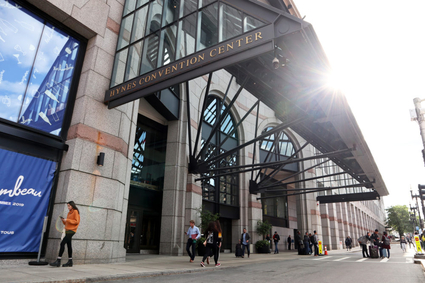SEPTEMBER 1997: Organizers of MacWorld, the giant annual computer trade show, announce that they are leaving Boston for New York.
Anguished wails ensue. Tourism lobbyists cry that Boston is sinking into oblivion. Politicians warn that only a massive new convention center — built at taxpayer expense — can restore the city's stature.
Leading the keening is Mayor Tom Menino. "MacWorld is a huge loss for the city. This points out the desperate need for us to have a new convention center."
Hotel owners and restaurateurs agree. "We used to think we could compete with New York, Orlando, and Las Vegas," says nightclub mogul Patrick Lyons. "Now we have to worry about Charlotte, Philadelphia, and Baltimore. They get it, and we don't."
 The renovation of the existing Hynes Convention Center was supposed to cost $71 million. The final tab was $475 million. Now Beacon Hill wants to build a new convention center for $700 million. Expect the final tab to be far higher. |
The Boston Herald calls MacWorld's move further evidence of "Boston's glaring need for a new and larger gathering space." Perhaps, editorializes the Globe, "the shame of MacWorld's departure will prod local officials into belated action. But the city's largest piece of convention business has already been lost."
Now comes word, just 10 months later, that MacWorld isn't lost after all. The big convention, with its 50,000 attendees, will be back in Boston next year. So will Seybold Seminars, another big show that had decamped from Boston to New York. The International Seafood Show, which attracts 20,000 visitors, will be here too. The Yankee Dental Congress will bring 25,000 more. The All-Star Game will be played at Fenway. The Ryder Cup — a high-profile international golf competition — will be in town. So will part of the NCAA basketball tournament.
Less than a year ago, the air was heavy with dire alarums that without a new government-funded convention center, Boston could pretty much kiss major gatherings and tourist events goodbye. Now the city is looking at one of its biggest big-event years ever. The panicky clamor of last fall seems, in retrospect, ridiculous. The case for an expensive new convention center was always weak. Now it is laughable. Boston has all the conventions and trade-shows it can handle.
So. Are Menino, Lyons, the hotel lobbyists, and the rest of the convention-center pom-pom squad sheepishly repudiating the clamor they kicked up in September? Are they belatedly admitting that Boston, with its 500,000 square feet of exhibition space, is able to accommodate the vast majority of conventions? Are they dropping their demand that taxpayers be forced to underwrite an immense boondoggle in order to keep Boston a "world-class city"?
In a pig's eye.
Anyway, the point is moot. The Legislature adopted a convention center bill in November, and the Great Taxpayer Fleecing has begun. New fees and surcharges have been added to the cost of hotel rooms, parking spaces, car rentals, and sightseeing tours. Meals, beverage, and sales taxes are being hiked in South Boston and on the Waterfront. The city will issue medallions for 260 new taxis at a staggering price of $23 million.
A huge transfer of wealth from the people is underway, all for the purpose of enriching a small clique of well-connected business operators and politicos. Boston's hoteliers, restaurant owners, and nightclub kings will make out like bandits. So will their lawyers, flacks, and political cronies. But not Joe Voter and his patient wife Jane. They are going to end up with fewer dollars, fewer economic choices, and fewer meals out.
Joe and Jane are being told that the new convention center will cost them $700 million, but that is merely where the bidding starts. The renovation of the existing Hynes Convention Center was supposed to cost $71 million. The final tab was $475 million. The Central Artery/Tunnel project used to be called "the $2.2 billion Big Dig." Then it turned into the $4 billion Big Dig. Then the $7.7 billion Big Dig. Now it's the $10.5 billion Big Dig, and the overruns run over.
The one sure thing about the new "$700 million convention center" is that it will cost at least $2 billion. It will never make a profit, never earn enough to repay its capital costs, probably never even cover its operating costs.
It will, however, almost surely become a dumping ground for hacks, has-beens, and hangers-on.
Two premises underlie this project. First, that state and local politicians are qualified to create and run a large business. Second, that a handful of government officials can do a better job than the market of identifying the most productive use for $2 billion and 600,000 square feet of land.
Both premises are false. Bureaucrats almost always prove incompetent when they try to take the place of entrepreneurs and professionals. In the absence of competition and a bottom line, government managers face no penalty for failure. So they usually lose money, perform badly, and disdain the public.
Take a walk along Massachusetts Avenue. That grand boulevard, one of the stateliest in Boston, looks like an open dumpster and smells like a urinal. A gigantic convention center won't add a thing to Boston's charm and appeal. Clean streets, on the other hand, would make this "walker's city" more inviting than ever.
It isn't difficult to sweep garbage out of the gutters. If even that is more than the government can handle, what business does it have messing around with conventions?
(Jeff Jacoby is a columnist for The Boston Globe).
-- ## --
Follow Jeff Jacoby on Twitter.
Discuss his columns on Facebook.
Want to read more? Sign up for "Arguable," Jeff Jacoby's free weekly email newsletter.

